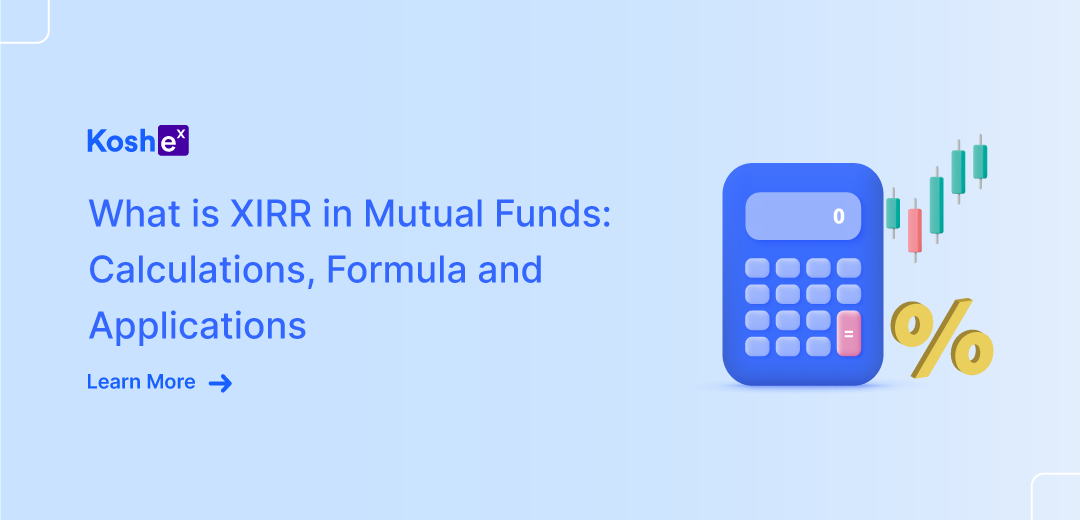Mutual funds stand out as a crucial element in retirement planning because they give investors a smart and practical way to meet their long-term financial objectives. The important role that mutual funds play in the context of retirement planning is explored in this Blog
Life after retirement consists of those years when each one of us leaves worries to finally live a stress-free life. However, one of the most crucial aspects of achieving this is by planning your finances properly.
Financial management is an essential element of retirement planning that ensures a comfortable and secure future. Among the various investment options available, mutual funds have emerged as a popular choice for retirement planning.
Let’s explore the role that mutual funds play in retirement planning and how you can select the right mutual fund for retirement planning with Koshex.
What are Mutual Funds?
Mutual funds are investment vehicles that pool money from multiple investors and invest in a diversified portfolio of stocks, bonds, or other securities as per the terms of the scheme. They are managed by professional fund managers who make investment decisions based on the fund’s objective and strategy.
Mutual funds offer several benefits for retirement planning including diversification, professional management, liquidity, and affordability. However, before you begin investing in mutual funds, you need to determine how much corpus you need to lead an independent and stress-free retirement life.
How Much Do You Need for Retirement?
Determining the required corpus for retirement is the first step toward retirement planning. A common thumb rule is to divide your annual expenses at the time of retirement by 4%. This calculation is based on the assumption that withdrawing 4% annually from your retirement corpus should be sustainable over the long term.
For instance, if you estimate your annual expenses at the time of your retirement as Rs. 15 lakhs, then you would need a retirement corpus of Rs. 5 crores. This entails that even if you withdraw 4% from your Rs. 5 crore corpus, you would be able to meet your annual expenses without any hassle. You can adjust the 4% to any other percentage points as per your needs and preferences.
How You Can Plan for Retirement Using Mutual Funds?
Once you have determined the corpus required for retirement, you can use mutual funds to plan and effectively build your savings. Here’s how you should plan for your retirement using mutual funds:
- Determine Corpus for Retirement: As mentioned earlier, calculate the corpus required based on your estimated annual expenses. Consider factors such as inflation, healthcare costs, and any additional financial goals you might have during retirement.
- Calculate How Much You Should Save and Invest: Based on your desired retirement corpus and the number of years left until retirement, calculate the amount you need to save and invest regularly. Mutual funds offer systematic investment plans (SIPs) that allow you to invest a fixed amount at regular intervals. The amount automatically gets deducted each month from your bank account. This ensures a disciplined approach toward saving and investing.
- Start as Early as Possible: Time plays a crucial role in retirement planning. The earlier you start investing in mutual funds, the more time your investments have to grow. Starting early also allows you to take advantage of the power of compounding. Compounding shows magic in the later years of your investment and has the potential to grow your investment portfolio magnificently.
Selecting the Right Mutual Fund for Retirement
There are thousands of mutual fund schemes available from different companies. Choosing the right mutual fund for retirement planning can be tricky and requires careful consideration. Here are some of the key factors to evaluate for selecting the right mutual fund for retirement:
- Check Fund Goal: You should select funds that align with your retirement and financial goals. If you have a long investment horizon, then you should consider equity-oriented funds that offer higher growth potential. For a shorter time frame, debt funds or balanced funds may be more suitable.
- Check Long-Term Performance: You should assess the historical performance of the fund over an extended period, preferably five to 10 years. While evaluating, you should ensure to look for consistency in returns and compare them with the fund’s benchmark and peers.
- Check Expense Ratio: Mutual funds charge an expense ratio, which is the annual fee deducted from the fund’s assets. It goes toward meeting the expenses associated with the management and administration of the mutual fund. Lower expense ratios are generally favorable as they maximize your overall returns.
- Research Asset Management Companies (AMCs): You should evaluate the reputation, experience, and track record of the AMC managing the mutual fund. Apart from this, you also need to consider the size of the fund’s assets under management (AUM) because it reflects investor confidence and the ability to manage large investments effectively.
Wrapping Up
Mutual funds can play a significant role in retirement planning by providing a diversified investment option managed by professionals. They offer flexibility, affordability, and the potential for growth over the long term. Determining the required retirement corpus is the first step toward successful retirement planning. Selecting the right scheme is what follows next. You can either invest through lumpsum investment or a systematic investment plan (SIP), the latter being the preferred mode.
Koshex is one of the pioneering investment platforms that provide you with the option to invest across 5000 different mutual fund schemes including equity funds, debt funds, ELSS funds, etc. You can select the ideal mutual fund scheme based on your individual financial goals and preferences. The earlier you start investing in these schemes, the more amount of corpus you will be able to generate in the long run. Start your retirement planning now with Koshex.
Frequently Asked Questions (FAQs)
1. Are mutual funds suitable for all investors planning for retirement?
Mutual funds can be an excellent choice for retirement planning and they may be suitable for all investors. However, factors such as risk tolerance, investment horizon, and financial goals should be considered. As there are multiple schemes of mutual funds available for investment, they cater to almost all categories of investors. However, it is advisable to consult with a financial advisor to assess your individual circumstances and determine the most appropriate investment strategy.
2. Can I rely solely on mutual funds for retirement planning?
While mutual funds can be a significant component of your retirement portfolio, it is generally recommended to have a diversified approach. Consider diversifying your investments across different asset classes like stocks, bonds, real estate, and fixed deposits to reduce risk and enhance returns. You can also invest in different types of mutual funds to diversify your portfolio.









Leave a Comment